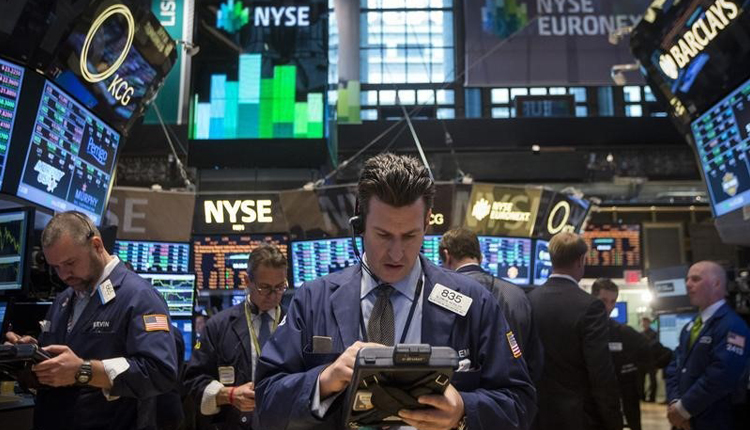The Dow Jones Industrial Average surged on Friday, led by gains in Apple and IBM, as investors pored through newly proposed tariffs on U.S. goods by China and fresh jobs data.
The 30-stock index earned 136.42 points to end at 25,462.58 as Apple rose 0.3 percent, adding to its market cap of more than $1 trillion. The tech giant reached the milestone for the first time on Thursday as investors cheered strong quarterly results released earlier this week. IBM also contributed to The Dow’s gains, rising more than 3 percent.
Meanwhile, the S&P 500 gained 0.5 percent to 2,840.35 as consumer staples outperformed. The Nasdaq Composite advanced 0.1 percent to 7,812.01.
The three major indexes closed higher for the week, with the S&P 500 and Nasdaq rising 0.8 percent and 1 percent, respectively. The Dow rose just 0.04 percent this week. The S&P 500 and Dow also posted their fifth straight weekly gain.
China said Friday it will slap tariffs on $60 billion in U.S. goods, with charges ranging from 5 percent to 25 percent. Many of the goods are agricultural-related, with others on various metals and chemicals.
The action would be in response to increasingly protectionist policies taken by the U.S. on trade. Earlier this week, President Donald Trump instructed U.S. Trade Representative Robert Lighthizer to consider raising proposed tariffs on $200 billion in Chinese goods to 25 percent from 10 percent.
Scott Clemons, chief investment strategist at Brown Brothers Harriman, said he is not too worried about these tariffs yet. “Even if you take the proposed tariffs into account, the impact would be rather limited,” he said. “from a macroeconomic standpoint, it’s still pretty small.”
Clemons said that if the tariffs have a material impact on the consumer, it “would be a risk,” but notes that is not yet the case. Corporate earnings and the U.S. economy, especially the labor market, are still strong, he said.
Larry Kudlow, Trump’s top economic advisor, told reporters at the White House on Friday that there has been some communication “at the highest level” on trade between the United States and China in recent days.
“Small caps are going down and large caps are rising. I think that’s because people are feeling better about the trade situation,” said Dave Lutz, head of ETF trading at JonesTrading.
The U.S. economy added 157,000 jobs last month, the Labor Department said Friday. Economists polled by Reuters expected a gain of 190,000.
The headline jobs growth number for July missed expectations, but past months’ figures were revised substantially higher. Plus, wage growth met expectations. Jobs growth for June was revised up to 248,000 from 213,000, while wages grew by 2.7 percent in July on a year-over-year basis.
Investors take a close look at the jobs report every month as they look for clues regarding the pace of the Federal Reserve’s future interest rate hikes. The Fed kept interest rates unchanged after a meeting this week, but market expectations for a rate hike in September are at 93.6 percent, according to the CME Group’s FedWatch tool.
“The financial conditions are so far away from where the Fed wants them to be that I think two more rate hikes [this year] are almost a certainty,” said Jason Thomas, chief economist at AssetMark.
Source: CNBC


